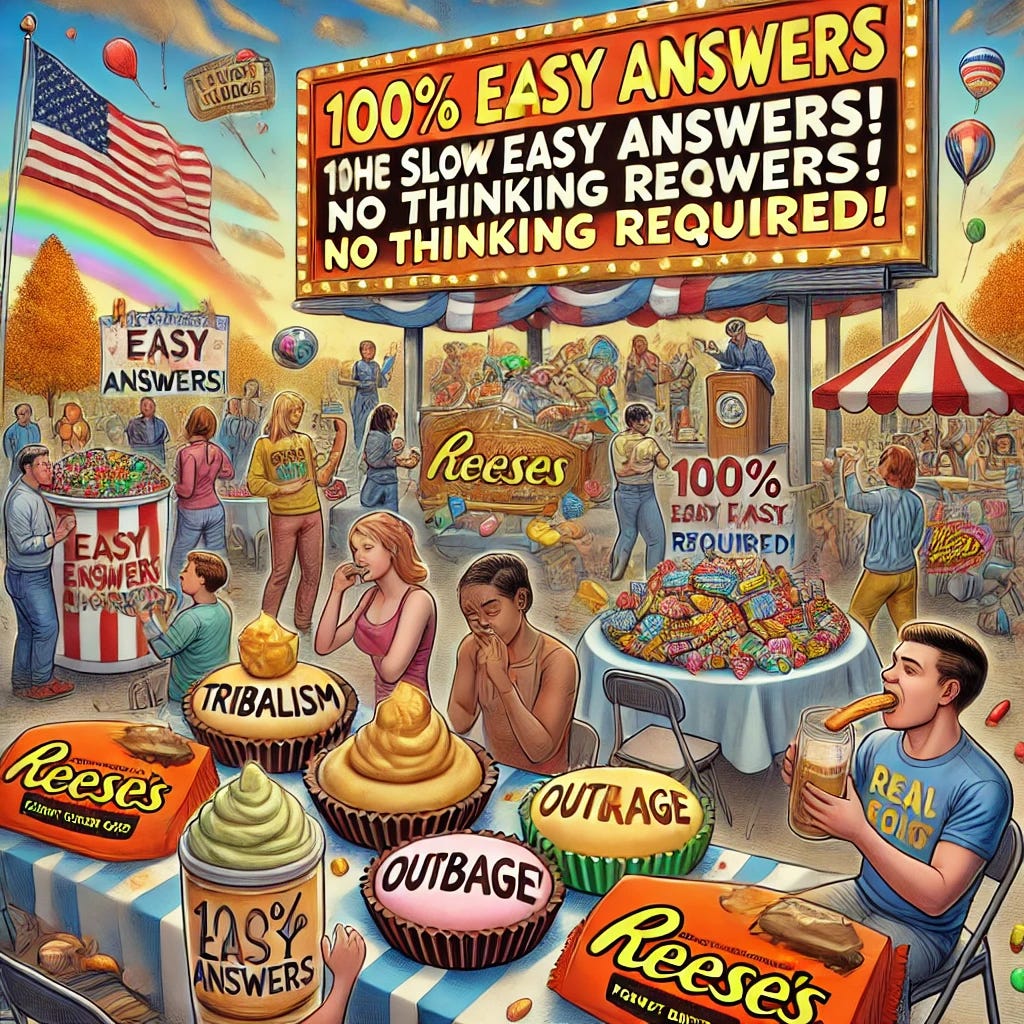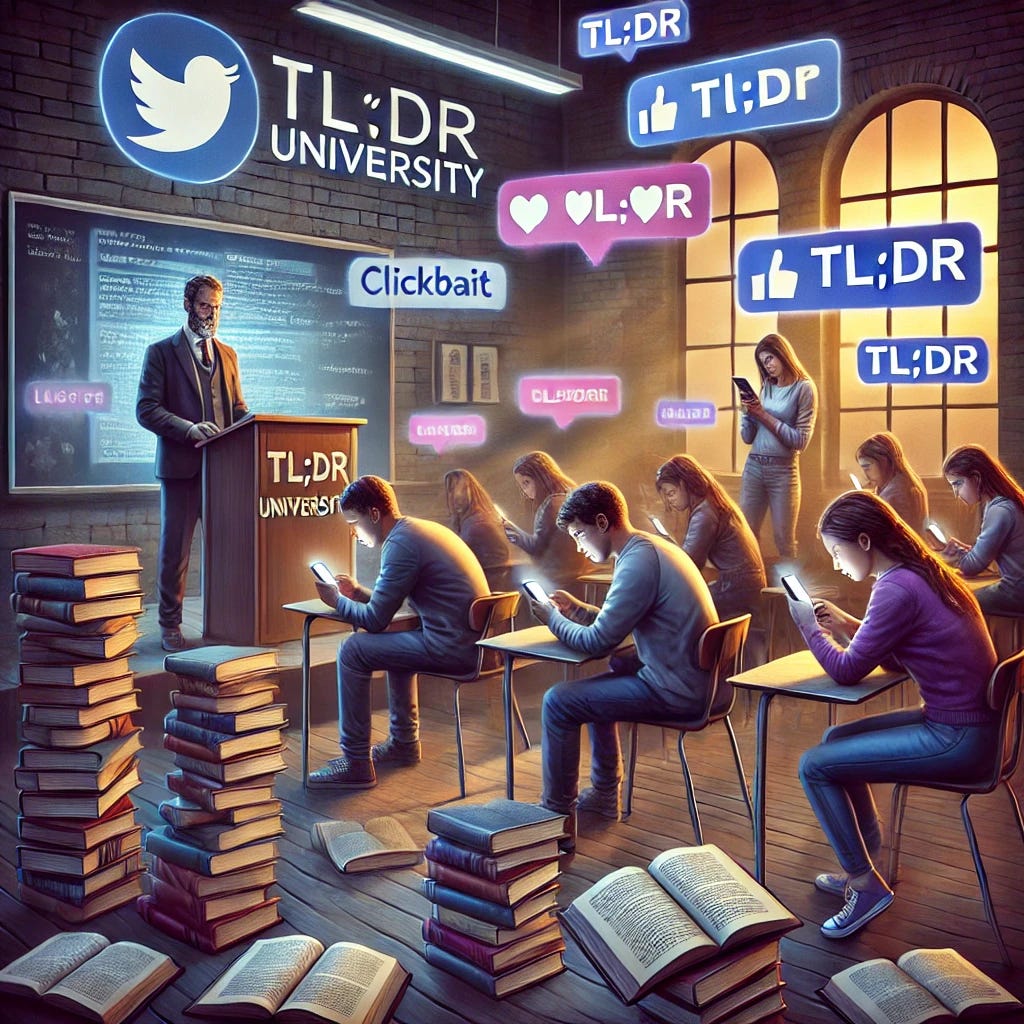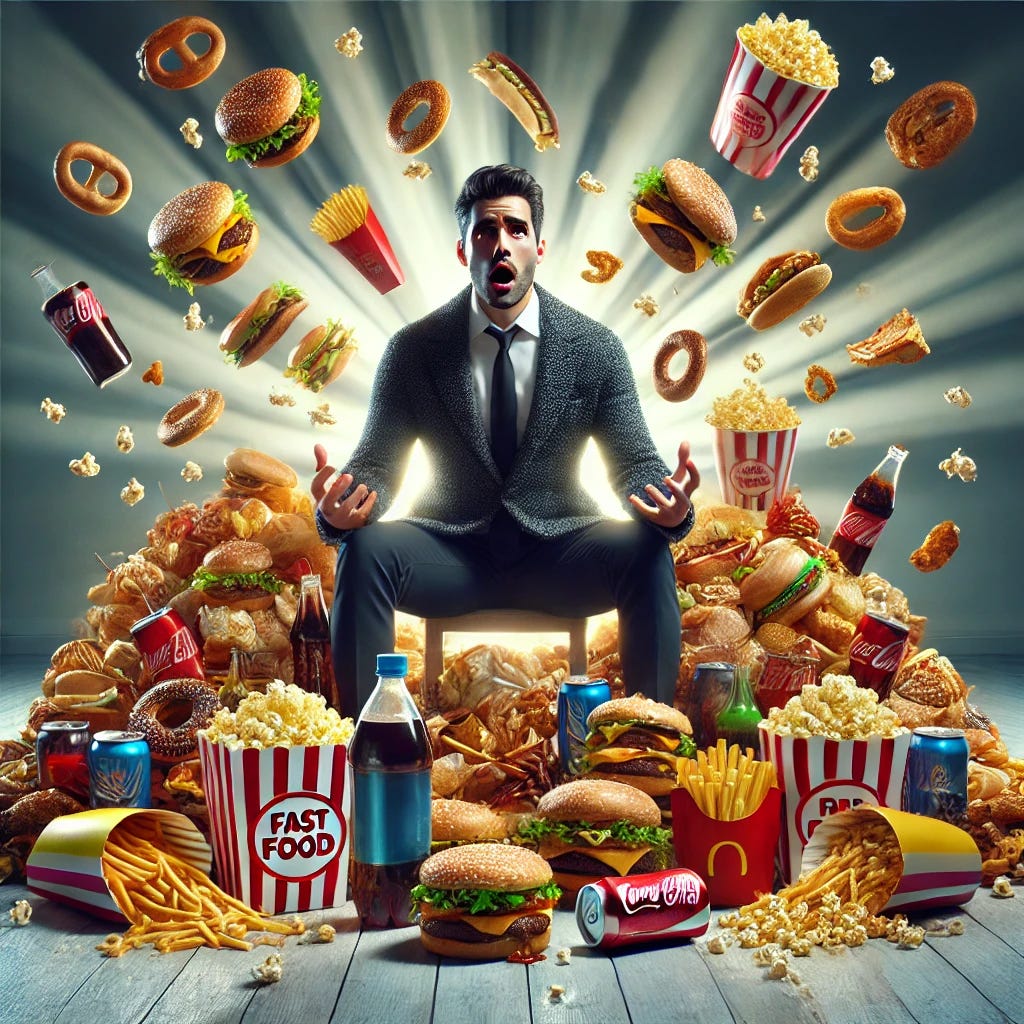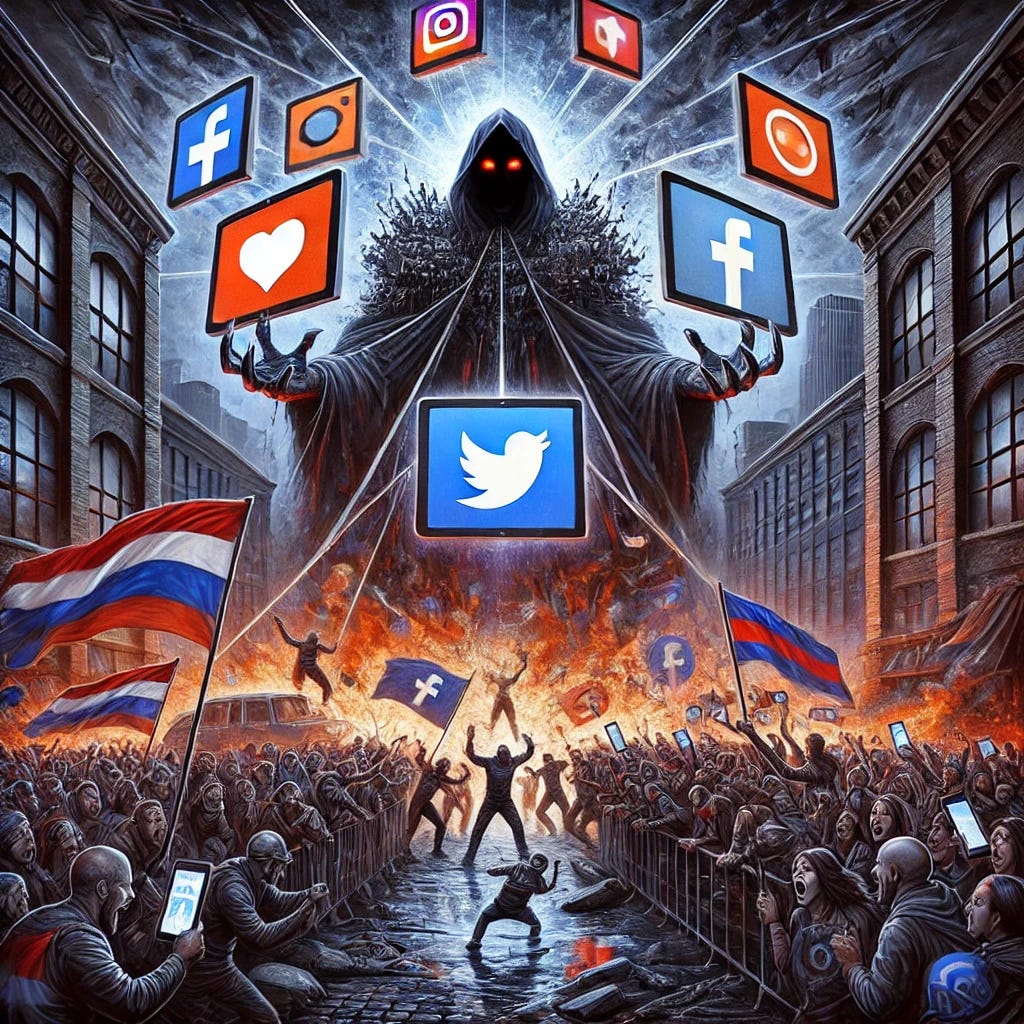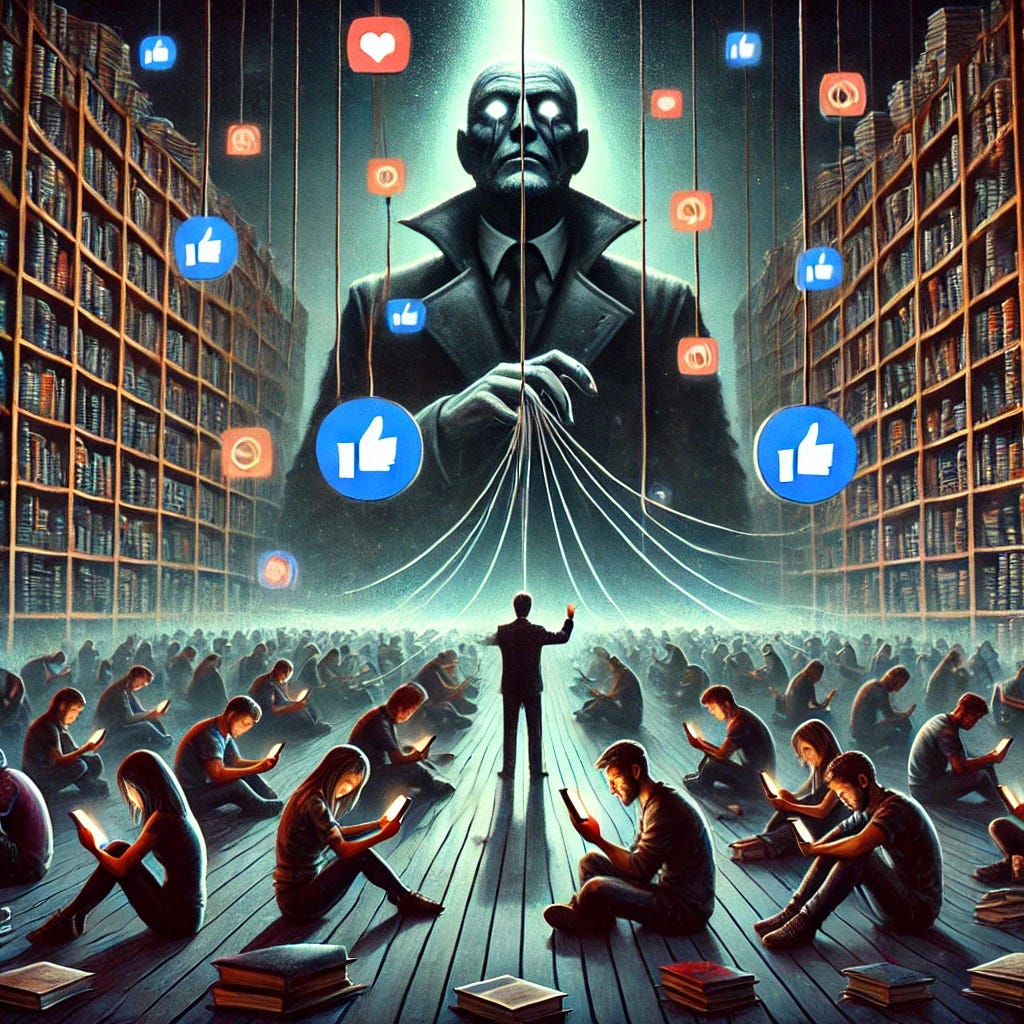Why Think When You Can Snack On Outrage?”
On Reese's Peanut Butter Cups and the Slow Death of Democracy
If you believe in the importance of free speech, subscribe to support uncensored, fearless writing—the more people who pay, the more time I can devote to this. Free speech matters. I am a university professor suspended because of a free speech issue, so I am not speaking from the bleachers. The button below takes you to that story.
Please subscribe and get at least three pieces /essays per week with open comments. It’s $6 per month and less than USD 4. I know everyone says hey, it’s just a cup of coffee (with me, not per day but just one per month), but if you’re like me, you go, “Hey, I only want so many cups of coffee!”
But I only ask that when you choose your coffee, please choose mine. Cheers.
Recently, in my university class, I asked 180 students to do a six-question quiz on digital dating. In one version, I put a 100-word explanation paragraph before the first quiz question; in the second version, I placed the text block after the last question.
About 85% of the students who looked at the first version refused even to start the quiz; the second version's compliance rate was 40% higher.
Of course, it's not a definitive test. The students seemed to look at the prospect of reading a few paragraphs, and they ran away; it was not the topic that drove them away but the idea of reading itself.
For years, I have asked students how many read for pleasure and how many read the assigned textbooks. Numbers are falling; not reading or even purchasing textbooks has become a point of pride; they don’t even lie to me when I query them in front of the class.
"Made it through university and never bought a textbook," one young woman crowed.
That reflects more on the university's sorry state than
The young woman's intelligence.
They complained bitterly when I told a fourth-year business class to read 240 pages. Why couldn't I be like all their professors/instructors who told them skimming the PowerPoint was good enough? There was talk of complaining to the Department Head.
The horror.
But this may seem like another, "This new generation will send the world to hell.”
It’s a well-trodden rant, a generational meme that every generation shows to the younger generation - but it’s much more than that.
Though digital natives spend more time online on their phones than their parents, it's not like Gen X is poring over Homer's Odyssey in their spare time. They are probably busier in their Honda Odyssey, driving to the mall to get the iPhone 15 Super Max or whatever shiny toy from Apple they are hankering after.
According to Statistica, while Generation Z spends over seven hours online daily, those ancient 55-64-year-olds are online for five and a half hours.
Again, complaints about declining rates of long-form reading are familiar.
The danger is that this phenomenon, in combination with social media and other digital fentanyl, leads to a decline in critical thinking. It’s a problem when folks are chasing social media dopamine hits - with video lapping text in popularity by a greater margin each year - and it gets them too high and distracted to figure out that their dullness is making them easy prey for political debate that is now closer to Crest vs. Colgate than Kennedy vs. Nixon.
Is the intersectionality (not the hip form) of declining long-form reading, sliding attention spans, social media algorithms, tribalism, and cultural normalisation of these factors destroying our democracy?
Why assume that democracy’s only exit strategy is through the no-free-press door? Why go to all that effort? Can’t we end it by creating a population that can't separate the meaningful from the mundane and is too apathetic to try or too dull even to see it as an issue?
Why starve people to death? Just give them enough wretched food and soft furniture, and they’ll thumb their ride on the highway to the great beyond.
Will we end up turfing democracy by chasing clickbait or by just being too comfortable repeating tribal buzzwords, too indolent to make any attempt to move beyond binaries - oppressed vs oppressor, anyone?
Or will we chase political fashions as if it were all about wearing a particular political brand - “New, improved! Now woven from pure hubris, luxuriate in the comfort of moral certainty while snuggling in the soft inner lining of 100% unquestioned moral superiority!”
Such is the pleasure of wearing a Keffiyeh and screaming "Free Palestine" in the university library rather than reading a book on the history of Israel and the lamentations of the Palestinians.
It is no small wonder that we see an increase in tribalism. Tribalism is easy: pick a team and get the team merch, usually about ten talking points. Display/wear merch.
Nuance, answering with "it depends," peeling back layers of implicit assumptions, watching out for your own confirmation bias? That's hard work.
Yes, we are becoming dumber and dumb is the sugar baby of sugar daddy authoritarianism.
The irony of it all.
We are surrounded by information, carrying tiny supercomputers that can access an ecosystem full of all the world offers. But the problem is that much of that digital ecosystem is porn, social media, and the less-than-revelatory revelations of the influencer and wannabe influencer community.
It's no wonder politicians prioritize branding over substantive policy stances. If all these potential vote-providing units cap their intellectual pursuits at a hundred words, that's good news for demagogues, image consultants, and branding specialists.
According to the National Literacy Trust, the number of children 8-18 who read daily in their free time has decreased by 26% since 2005—from 38.1% to 28.0%. At this rate, reading will become about as popular as the 24th COVID shot. But 86% of young Americans want to become influencers.
A recent survey by the Reboot Foundation out of Paris highlighted concerning trends in critical thinking habits. Only a little over half of people believe their critical thinking skills have improved since high school, while nearly a quarter feel their skills have declined.
A less informed public, unused to critical thinking, more tribally driven and less open to slogging through complex arguments, is easily manipulated by political messaging that has surface appeal but, upon scratching beneath, offers little.
Indeed, knowing this, political parties, driven ultimately by votes, should focus their energies on branding rather than chasing policy schemes that can’t be explained in a tagline or a clever GIF. Isn’t expecting voters to extend their reading attention range beyond a hundred words, expecting the market to adapt to the brand? Bad marketing.
Branding, while certainly about creating a reputation, is also about grabbing and favouring those skilled at gaining such attention. It is the squeaky wheel problem on steroids, giving voice to the frivolous and the shallow.
Critical thinking skills require time and mental investment; learning curves generally venture cautiously right, on a gentle incline, only to climb later. The time to that climb is more than the average reading attention time on social media. With the average social media user up to two and a half hours a day, there is also the issue of opportunity cost.
Engagement in one activity eliminates the option for a more redeeming activity—only so many hours in a day. And you can waste a life doing little more than pursuing digital entertainment, never pushing yourself to learn or discover new ideas, especially ones that might go against your natural presuppositions.
So, we are left with intellectual McNuggets served on the proper dinner plates.
Why make fancy meals when people want to grab protein bars as they walk by?
It's as if we have been put in a kitchen full of healthy food, fast food, candy, and every appliance under the sun. Should people wonder why we take the crappy food in the bright packaging and don't spend three hours preparing a proper meal? Especially when Netflix beckons?
Because we can.
We are very good at sacrificing the future for the present; it's the fatal flaw of democracy.
Critical thinking involves mental investment and focus. It's hard. Digital media consumption is easy. Multitasking is easy when you're just putting a quick dissolve straw in your Fanta and unwrapping your Double Whopper. It's more complicated when you're deboning a duck.
In addition to the negative impacts of multitasking, social media tends to prey on emotion rather than reason. Spending too much time making the lightest angel food cake?
This is food metaphor abuse—also too many food similies.
Social media's active creation of tribalism is a feature, not a bug. You can thank the algorithms behind your preferred platform for this, as these algorithms deliberately put information in front of you that reinforces your biases.
Reinforcing your biases is much easier than intellectually wrestling with an eight-page argument on a screen or paper, especially if the source document doesn’t have much white space or pictures.
Our brains don't lean toward analysis and problem-solving; they are designed to avoid problems, plug in holes, move past issues, and not push us into complexities. Just like your bodies don't naturally gravitate toward picking up weights, lifting yourself upward to level your chin with an iron bar or doing three more pushups when your arms are shaking.
Perhaps we have not changed; is it just a case of more palatable entertainment options, more intellectually expired McNuggets packaged to appeal to all our psychological weaknesses and ready to go after 30 seconds in the social media microwave?
But when we eat the easy tribal fast food, we aren't hungry anymore; we stop asking questions; we stop critical thinking.
It is the equivalent of those Reeses Peanut Butter Cups that someone left on the counter when we come home hungry, tired and irritated at 10:00 PM. They don't stand a chance.
____________________________________________________________________



